Emergency HVAC Wheatley
Best Emergency AC Repair in Wheatley
Receive multiple Emergency Furnace Repair quotes for your project today! Compare profiles, reviews, accreditations, portfolio, etc... and choose the best deal.

HeatView Emergency Plumber/Boiler Repair Bicester
53 reviews53 Orchard Way, Bicester, OX26 2EL, GBHeatView Emergency Plumber/Boiler Repair Bicester is a family run plumbing business, providing Bicester area with a friendly professional service for all your plumbing and boiler repair requirements.Our 24 hour emergency plumber Bicester. We specialize in all types of Plumbing services including Emergency Plumbing call outs, Boiler Repair, Boiler installation, Boiler servicing and full heating installations. HeatView Emergency Plumber/Boiler Repair Bicester pride ourselves as being one of the area’s premier 24 hour emergency Plumbing companies. When a problem occurs that requires an immediate response we offer complete solutions including Boiler repairs and waterleak repairs throughout Bicester 24 hours a day, 365 days a year. Highly skilled local Plumbers are on standby with fully equipped vans containing all the necessary equipment to carry out any Plumbing service. With our local Bicester engineers you know you’re in safe hands. We have had many recommendations through word of mouth. This is due to our policy of putting customer satisfaction as well as safety, above all else. Please contact one of are friendly office staff now to book a appointment.
- Services
- Why Us?
- Gallery
Get Quote
KPS Southern Ltd
4.73 reviewsWeston on the Green, Bicester, Oddington Grange Farm Industries, OX25 3QW, GBKPS Southern Ltd, formerly known as Kidlington Pipework Services, was established in 1986. We've built strong relationships with a diverse clientele, taking pride in our competitive pricing without compromising on quality, craftsmanship, or personalized service. In 2017, KPS Southern Ltd joined the Eco Environmental Engineering Group, continuing to expand and adapt to the ever-changing market. We offer a comprehensive range of mechanical installation services, including heater replacement or new installations, chilled water systems, plant rooms, ventilation, air conditioning, BMS controls, thermal insulation, domestic water services, and drainage. Our expertise covers a wide array of systems, from LTHW systems to chilled water systems, saturated and superheated steam, domestic hot and cold water, above ground drainage, buried gas and water services, medical and specialty gases, compressed air, ventilation systems, fume extract systems, and air conditioning for various applications. We also provide fully packaged BMS control systems for optimal energy management and fuel economy, giving clients complete control over their building services. We collaborate with electrical contractors to offer combined mechanical and electrical packages when required. KPS Southern Ltd is a member of BESA, Constructionline, CHAS, Safe Contractor Approved, and is Gas Safe registered.
- Services
- Why Us?
- Accreditations
- Our Team
- Testimonials
- Gallery
Get Quote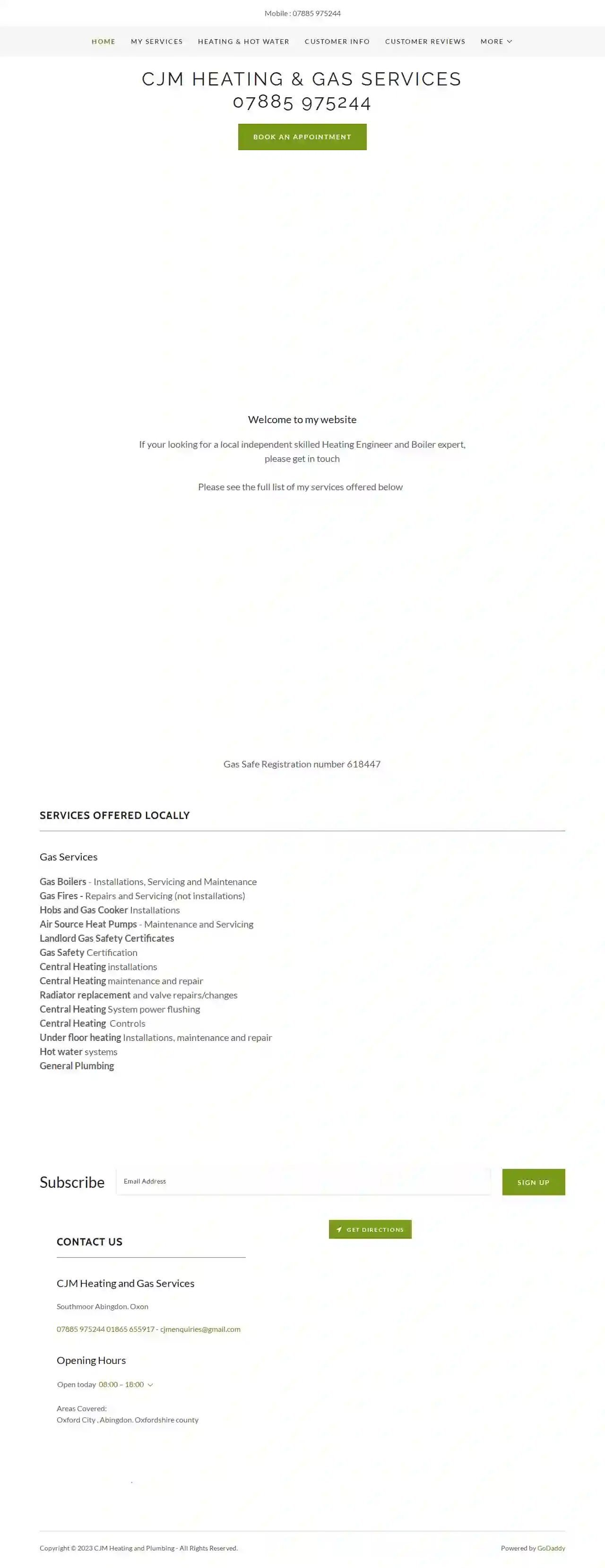
CJM Heating Gas LPG
4.611 reviewsAbingdon, Southmoor, OX14, GBWelcome to CJM Heating and Gas Services, a local independent skilled Heating Engineer and Boiler expert. If you're looking for a reliable and trustworthy service, please get in touch. We offer a range of services, including Gas Safe Registration number 618447. Our services are available locally in Oxford City, Abingdon, and Oxfordshire county. We're committed to providing excellent customer service and ensuring your heating and gas systems are safe and efficient.
- Services
- Why Us?
- Accreditations
- Gallery
Get Quote
JGC Cooling
Headington, Oxford, 94 London Road, OX14XS, GBJGC Cooling is a highly skilled, fully certified and accredited air conditioning services provider in Oxford. With over 10 years' experience, we offer a range of services including heater installation, repair and servicing, system installation, fan motor replacement, heat pump repair and services, and duct cleaning and repair. We work with leading air conditioning brands such as Daikin, Mitsubishi Electric, Mitsubishi Heavy Industries, Samsung, Fujitsu, LG, Panasonic, and Carrier. Our team is dedicated to providing top-notch comfort cooling solutions for residential and commercial properties in Oxford and surrounding areas.
- Services
- Why Us?
- Accreditations
- Our Team
- Testimonials
- Gallery
Get Quote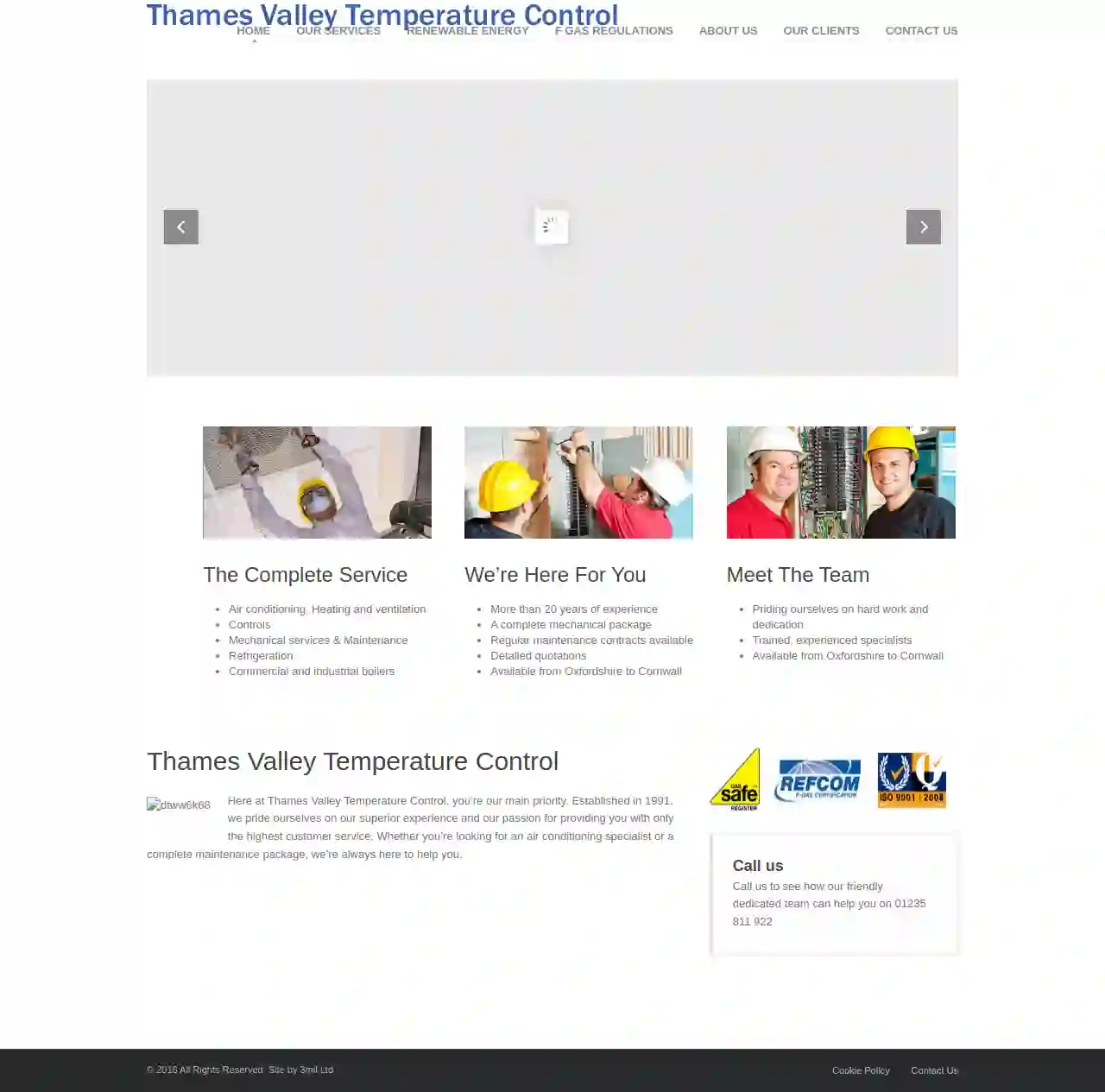
Thames Valley Temperature Control Didcot
Didcot, GBHere at Thames Valley Temperature Control, you’re our main priority. Established in 1991, we pride ourselves on our superior experience and our passion for providing you with only the highest customer service. Whether you’re looking for an air conditioning specialist or a complete maintenance package, we’re always here to help you.
- Services
- Why Us?
- Our Team
- Gallery
Get Quote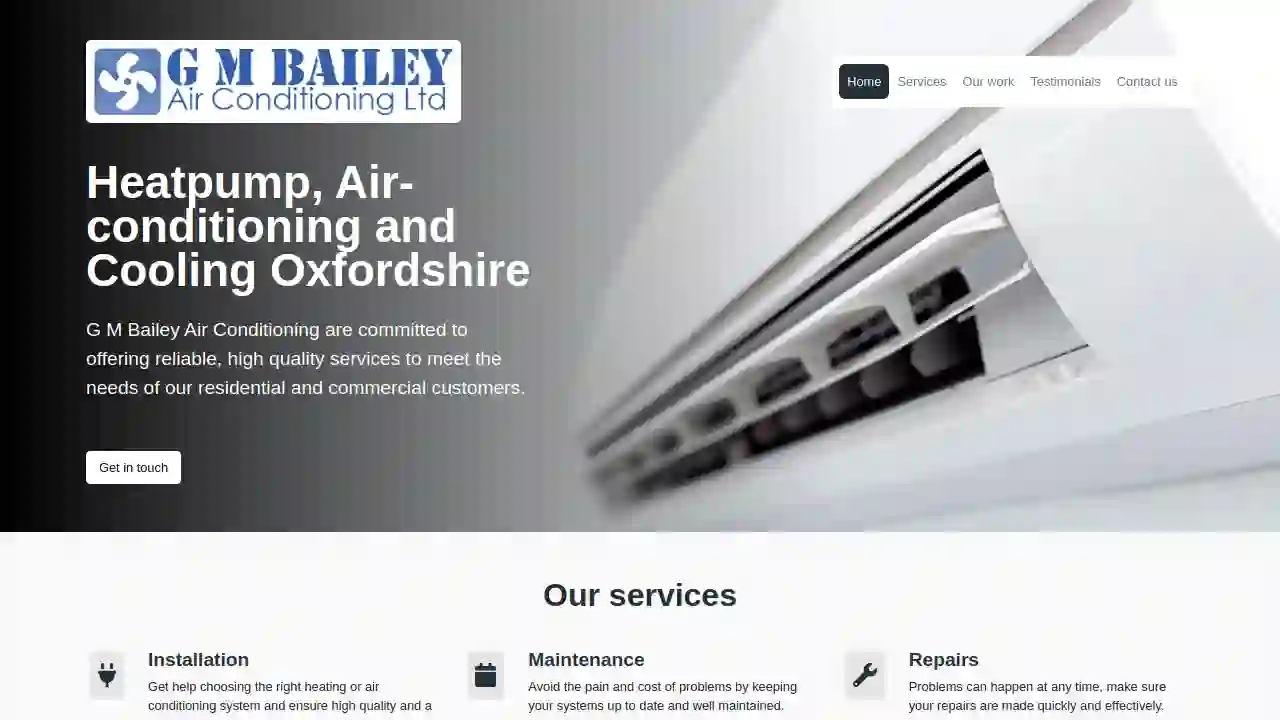
Bailey G M Air Conditioning Ltd
51 reviewsBradford Industrial Estate, Saltaire Road, Unit 10, Bradford, BD3 0AA, GBBailey Air Conditioning is a family-run business with over 25 years of experience in the air conditioning industry. We pride ourselves on providing high-quality, reliable service at competitive prices. Our team of qualified engineers is dedicated to ensuring your complete satisfaction. We offer a wide range of air conditioning services, including installation, maintenance, and repair. We also offer a 24/7 emergency service.
- Services
- Why Us?
Get Quote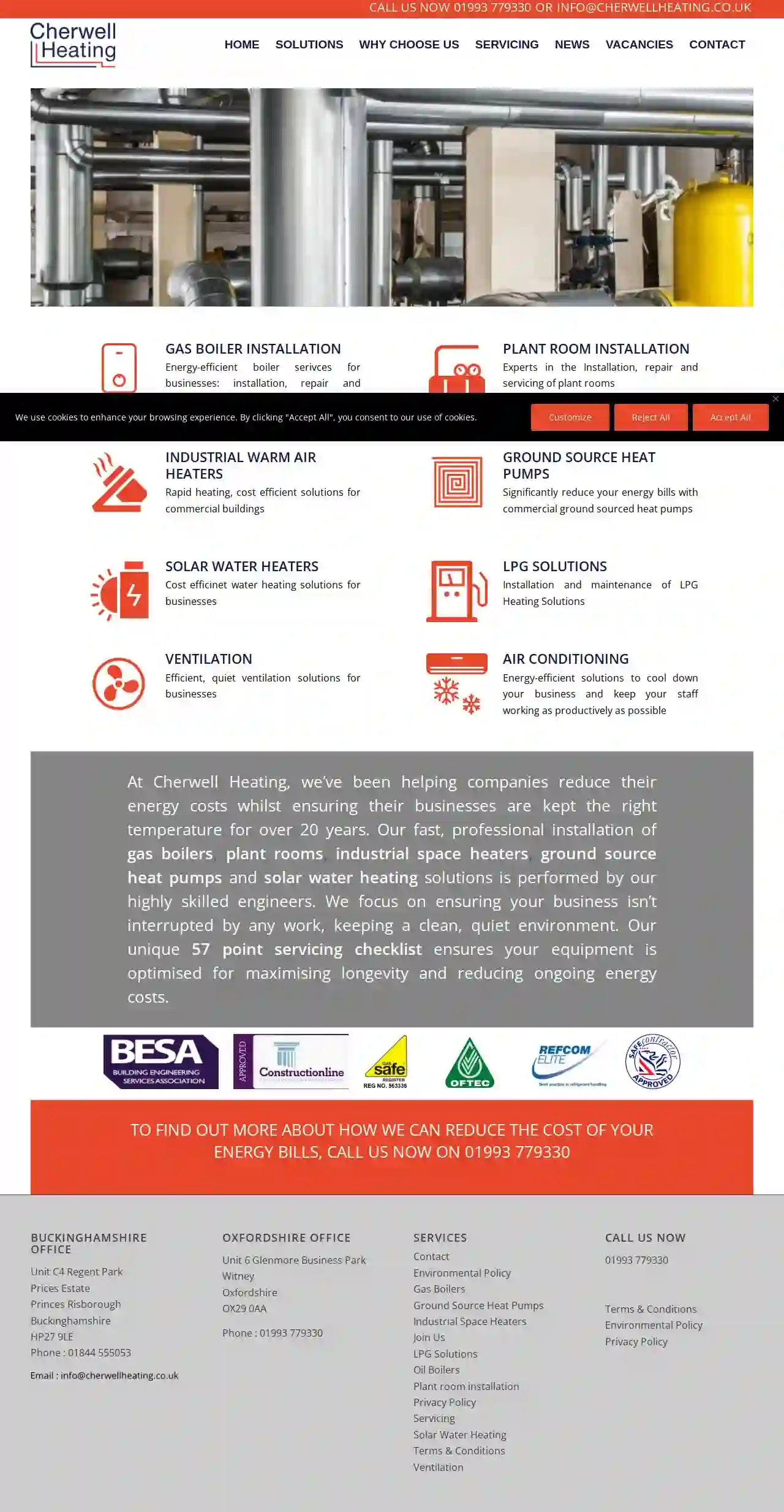
Cherwell Heating Ltd
Prices Estate, Unit C4 Regent Park, Princes Risborough, HP27 9LE, GBAt Cherwell Heating, we’ve been helping companies reduce their energy costs whilst ensuring their businesses are kept the right temperature for over 20 years. Our fast, professional installation of gas boilers, plant rooms, industrial space heaters, ground source heat pumps and solar water heating solutions is performed by our highly skilled engineers. We focus on ensuring your business isn’t interrupted by any work, keeping a clean, quiet environment. Our unique 57 point servicing checklist ensures your equipment is optimised for maximising longevity and reducing ongoing energy costs. To find out more about how we can reduce the cost of your energy bills, call us now on 01993 779330
- Services
- Why Us?
- Gallery
Get Quote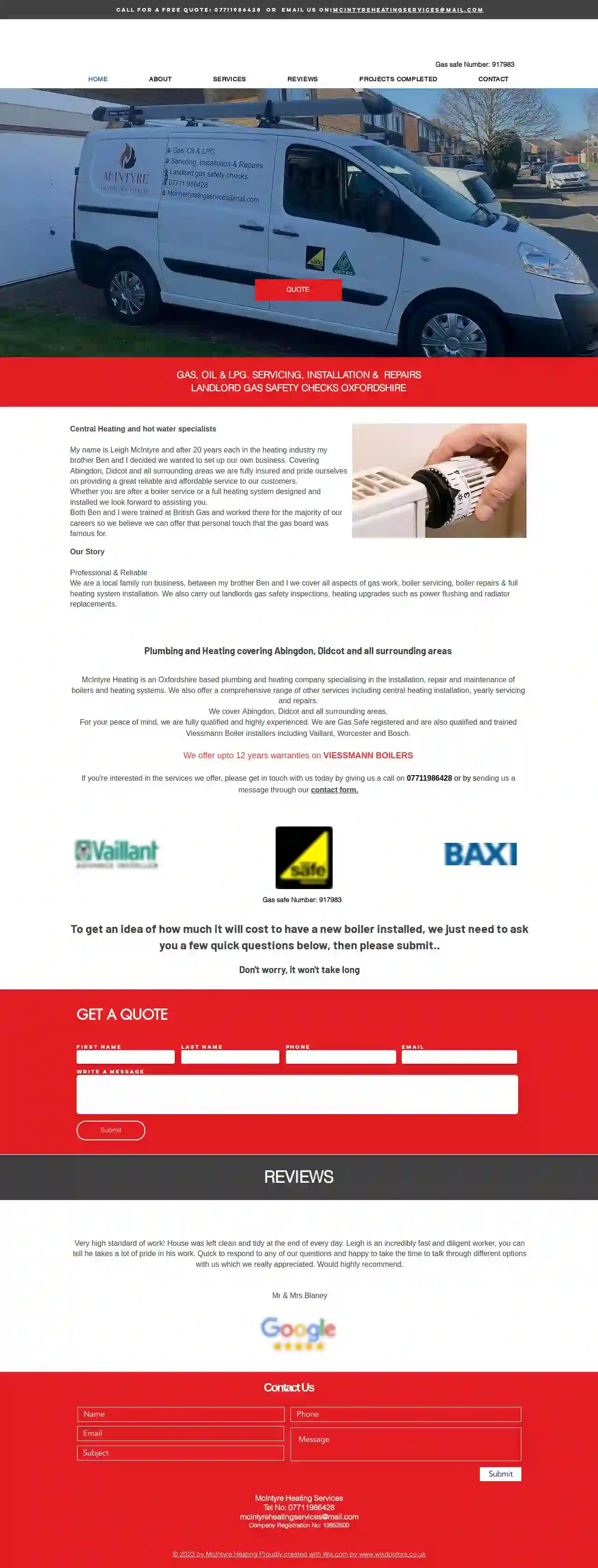
McIntyre Heating Services Ltd
Abingdon, GBMCINTYRE HEATING SERVICES LTD is your central heating specialist. We are a local, family-run business based in Oxfordshire, covering Abingdon, Didcot and surrounding areas. With over 20 years of combined experience in the heating industry, Leigh and Ben McIntyre, brothers and founders of McIntyre Heating, decided to establish their own company to provide a reliable, affordable, and personal service to their customers. Both Leigh and Ben were trained at British Gas and worked there for the majority of their careers. They believe this experience allows them to offer the same personal touch that British Gas was known for. McIntyre Heating offers a comprehensive range of services, including: Boiler installation Boiler maintenance Boiler repairs Full heating system installation Landlord gas safety inspections Heating upgrades such as power flushing Radiator replacements We are fully qualified and highly experienced, Gas Safe registered, and qualified and trained Viessmann Boiler installers, including Vaillant, Worcester, and Bosch. We offer up to 12 years warranties on VIESSMANN BOILERS. For a free quote, call us on 07711986428 or email us at [email protected]. We look forward to assisting you with all your heating needs.
- Services
- Why Us?
- Accreditations
- Our Team
- Testimonials
- Gallery
Get Quote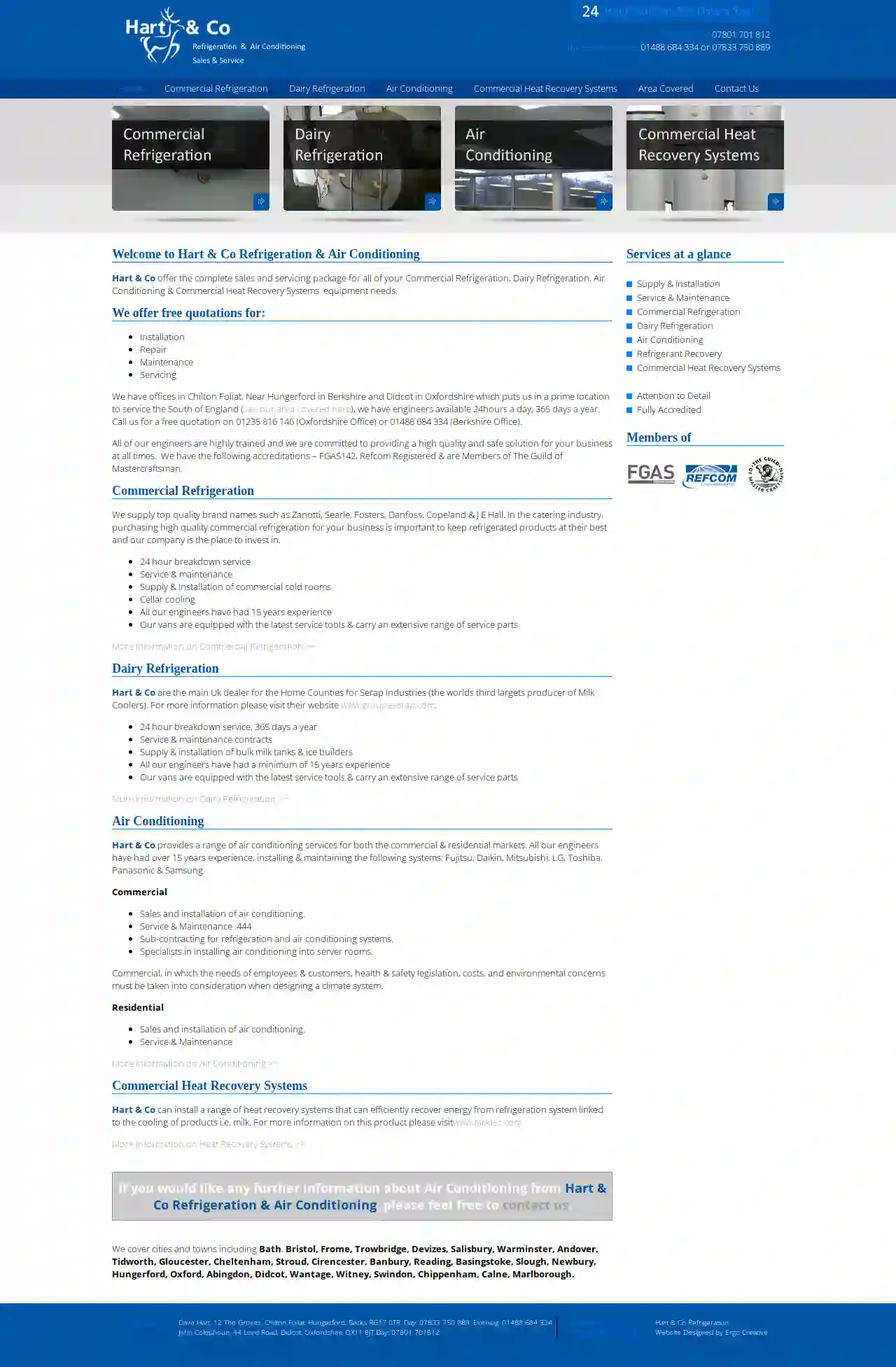
Hart & Co Refrigeration & Air Conditioning Ltd
Chilton Foliat, Hungerford, 12 The Groves, RG17 0TR, GBWelcome to Hart & Co Refrigeration & Air Conditioning. Hart & Co offer the complete sales and servicing package for all of your Commercial Refrigeration, Dairy Refrigeration, Air Conditioning & Commercial Heat Recovery Systems equipment needs. We have offices in Chilton Foliat, Near Hungerford in Berkshire and Didcot in Oxfordshire which puts us in a prime location to service the South of England. We have engineers available 24hours a day, 365 days a year. All of our engineers are highly trained and we are committed to providing a high quality and safe solution for your business at all times. We have the following accreditations – FGAS142, Refcom Registered & are Members of The Guild of Mastercraftsman.
- Services
- Why Us?
- Accreditations
- Our Team
- Gallery
Get Quote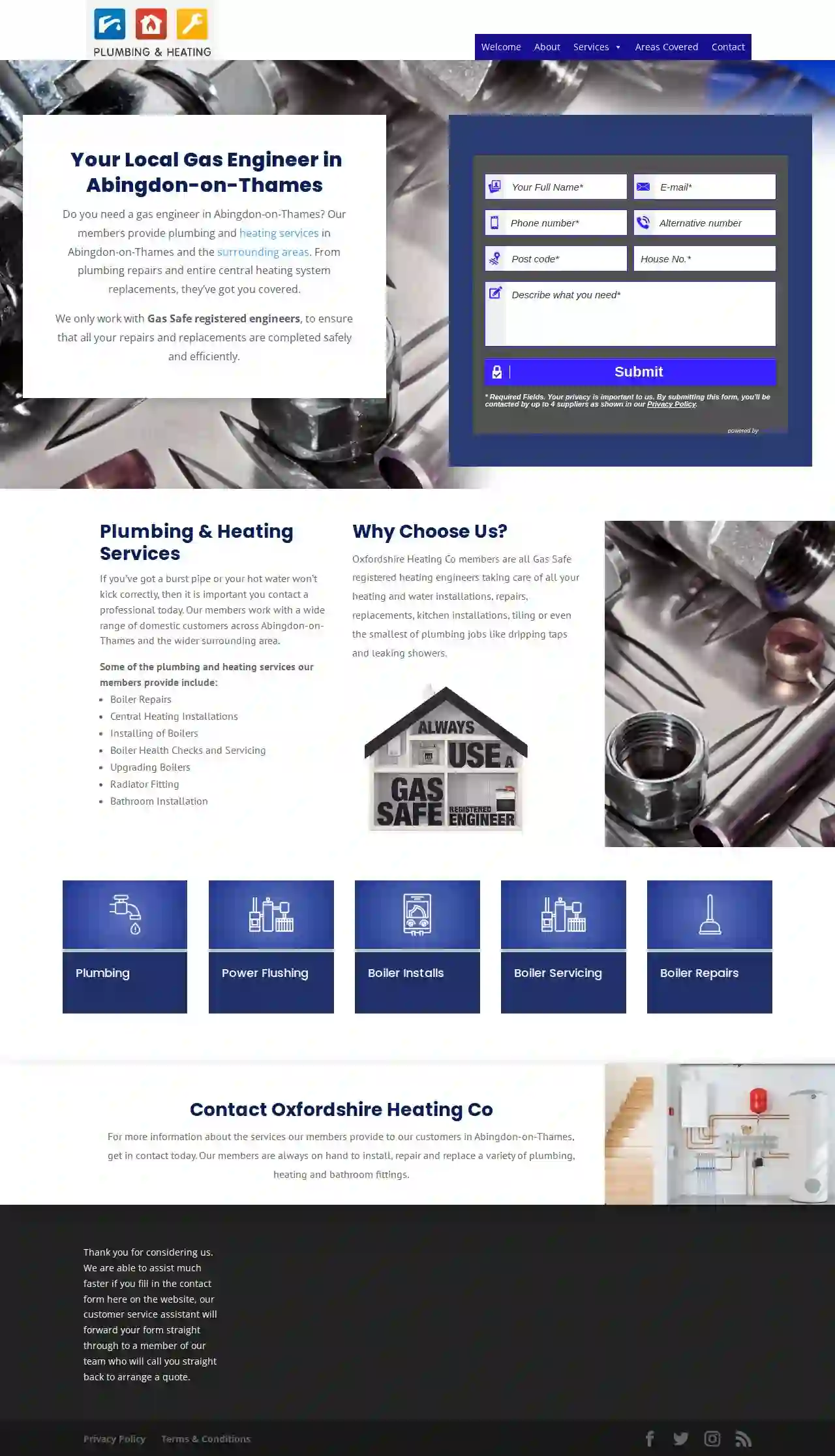
Abingdon Gas Services
Unit 1, The Business Centre, 100-102 Abingdon Road, Oxford, OX1 1AA, GBOxfordshire Heating Co connects you with Gas Safe registered heating engineers across Oxfordshire and the surrounding areas. We provide a wide range of plumbing and heating services, from small repairs like dripping taps to complete central heating system replacements. Our team of experts is dedicated to ensuring all work is completed safely and efficiently, giving you peace of mind. Whether you need a boiler repair, a new boiler installation, or regular servicing, Oxfordshire Heating Co has you covered. We also offer a range of other services, including power flushing, smart thermostat installation, and bathroom installations. Contact us today for a free quote and let us take care of all your heating and plumbing needs.
- Services
- Why Us?
- Gallery
Get Quote
Over 12,692+ HVAC Contractors registered
Our HVAC pros operate in Wheatley & surrounding areas!
HVACCompaniesHub has curated and vetted the Best HVAC Businesses in Wheatley. Find a trustworthy pro today.
Frequently Asked Questions About Emergency HVAC Services
- A rotten egg smell odor
- Hissing or whistling sounds near gas lines or appliances
- Blowing dirt or bubbles in standing water
- Dead or discolored vegetation near gas lines
- Physical symptoms like dizziness, nausea, or headaches
- Insulate Pipes: Insulate exposed pipes in unheated areas, such as crawl spaces, attics, and garages.
- Seal Air Leaks: Seal air leaks and cracks in walls and foundations near pipes.
- Keep Thermostat Consistent: Maintain a consistent thermostat setting, even when you are away, to keep indoor temperatures above freezing.
- Open Cabinet Doors: Open cabinet doors under sinks to allow warmer air to circulate around pipes.
- Let Faucets Drip: During freezing temperatures, allow cold water taps to drip slowly to relieve pressure and prevent pipes from bursting.
- MERV Rating: The Minimum Efficiency Reporting Value (MERV) indicates the filter's ability to trap particles. Higher MERV ratings mean better filtration.
- Filter Size: Make sure you select the correct size filter for your HVAC unit.
- Filter Type: Different types of filters are available, including pleated filters, HEPA filters, and electrostatic filters.
- Your Needs: Consider your indoor air quality needs. If you have allergies or pets, a higher MERV filter may be beneficial.
Are emergency HVAC services more expensive?
How do I know if I have a gas leak?
How can I prevent frozen pipes in the winter?
How do I choose the right HVAC filter?
Are emergency HVAC services more expensive?
How do I know if I have a gas leak?
- A rotten egg smell odor
- Hissing or whistling sounds near gas lines or appliances
- Blowing dirt or bubbles in standing water
- Dead or discolored vegetation near gas lines
- Physical symptoms like dizziness, nausea, or headaches
How can I prevent frozen pipes in the winter?
- Insulate Pipes: Insulate exposed pipes in unheated areas, such as crawl spaces, attics, and garages.
- Seal Air Leaks: Seal air leaks and cracks in walls and foundations near pipes.
- Keep Thermostat Consistent: Maintain a consistent thermostat setting, even when you are away, to keep indoor temperatures above freezing.
- Open Cabinet Doors: Open cabinet doors under sinks to allow warmer air to circulate around pipes.
- Let Faucets Drip: During freezing temperatures, allow faucets to drip slightly to relieve pressure and prevent pipes from bursting.
How do I choose the right HVAC filter?
- MERV Rating: The Minimum Efficiency Reporting Value (MERV) indicates the filter's ability to trap particles. Higher MERV ratings mean better filtration.
- Filter Size: Make sure you select the correct size filter for your HVAC unit.
- Filter Type: Different types of filters are available, including pleated filters, HEPA filters, and electrostatic filters.
- Your Needs: Consider your indoor air quality needs. If you have allergies or pets, a higher MERV filter may be beneficial.